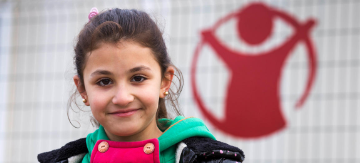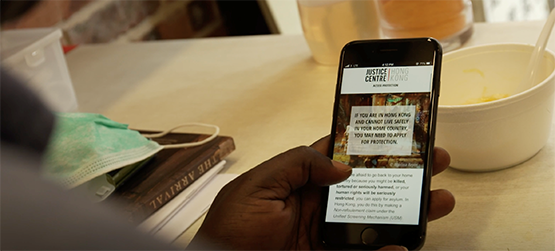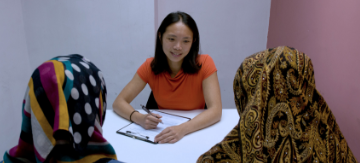Cox’s Bazar
Helping set up an emergency coronavirus clinic for refugees
With the coronavirus threatening the world’s largest refugee camp, we advised Save the Children International (SCI) on various legal issues relating to a planned isolation and treatment centre (ITC).
The camp, close to the Bangladeshi coastal city of Cox’s Bazar, is home to around 850,000 people. Most of its inhabitants are Muslim Rohingyas who have fled large-scale violence in neighbouring Burma’s Rakhine state. Given the camp conditions, practising social distancing is extremely difficult, if not impossible.
Emergency response
SCI already operates healthcare facilities at the camp. But, with an outbreak of coronavirus widely predicted, the World Health Organization asked SCI and four other international NGOs to each set up an ITC, with the aim of providing around 1,500 beds in total.
Having set up a similar facility in Sierra Leone during the 2014-15 Ebola outbreak, SCI has experience of operating treatment centres to deal with highly contagious diseases.
But each situation is different, requiring an appreciation of not only the specific medical requirements but also the relevant laws regarding the workforce.
A duty of care
Every employer has a duty of care towards its staff and those impacted by its operations. SCI is no exception, but its responsibilities are more complex given the range of people it employs and the ease with which the virus can spread.
SCI employees are mainly Bangladeshis and UK nationals. SCI also takes on volunteers, including many from the camp, some of whom are not literate. Any of these individuals could, in the course of their work, (unknowingly) contract the coronavirus and pass it on to colleagues or fellow camp inhabitants.
To help mitigate this risk, we helped SCI establish the appropriate protocols and procedures around risk assessments, health screening, illness reporting, quarantine, evacuation and training. We also had to consider the risks facing third-party contractors, such as caterers and cleaners.
We drafted consent forms to ensure workers understood the hazards and risks they face, and what they should do to reduce those risks as much as possible. For those unable to read or sign documents, we established verbal protocols instead.
How we've helped
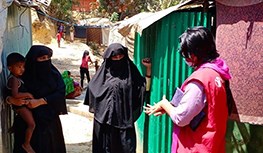
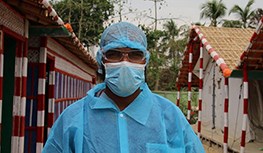
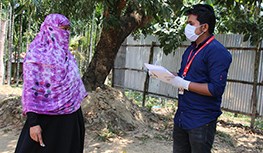
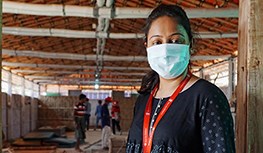
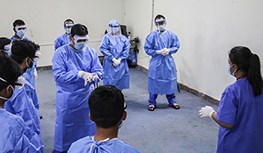
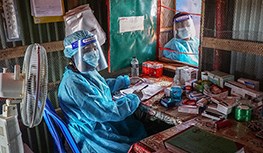
Securing PPE
As has been the case for medical authorities the world over, the procurement of personal protective equipment (PPE) was also a major concern. Export controls meant PPE might have to be sourced from within Bangladesh. And, given the urgency of the situation, SCI might have to source some PPE from unapproved suppliers, while still ensuring that the equipment satisfied applicable medical standards.
There was also the risk that, until adequate supplies were secured, there wouldn’t be enough PPE to go around, hampering the ability of the ITC to operate at full capacity.
We helped SCI amend its framework agreement for procurement to give it the protections it needed when sourcing equipment and other vital supplies for its staff.
Treatment centre now open
Since mid-May, cases of the coronavirus in the camp have been rising steadily. Thankfully, the ITC is now ready to begin admitting patients.
Clare Canning, SCI General Counsel, said: ‘We’re very grateful to Freshfields for quickly responding to our urgent request for help. The clear and practical advice they provided on these important issues has helped us protect a vulnerable community that is particularly susceptive to coronavirus. It’s in a crisis such as this that it’s so invaluable that we can turn to Freshfields for urgent and authoritative advice on unique and complex issues.
‘Freshfields’ pro bono work has gone a long way to ensuring that the ITC is now fully operational and providing vital healthcare in the camp. And that means being able to quickly deal with coronavirus patients and reduce the spread of the disease through a population already facing terrible hardships.’
Photo credits (L-R): Save the Children; Sonali Chakma/Save the Children; Sonali Chakma/Save the Children; Catherine McGowan/Save the Children; Sonali Chakma/Save the Children; and Catherine McGowan/Save the Children
Our team
-

George Swan Partner
London
-

Bethan Rodden Associate
London
-

Charles Smye Associate
London
-

Amy Rentell Knowledge Lawyer
London
